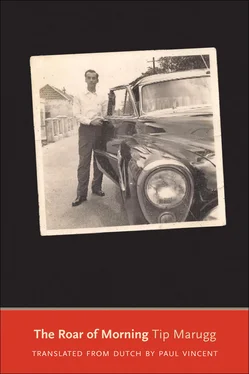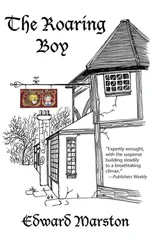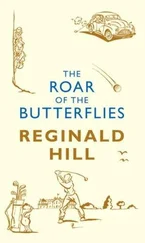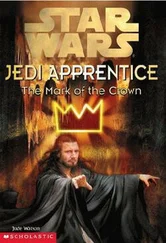But whenever a man and a woman are together, even in a make-believe nocturnal paradise, they hear the writhing and hissing of accursed, shambling creatures. Every spark of the human spirit has its antidote, every sensory delight a grain of venom. Again and again, whenever a feeling of contentment starts to well up in me, it is overwhelmed by a snapping sound that crudely tarnishes everything.
I start to feel that certain organs in my body have speeded up their functions. My blood is pounding wildly through my brain and is being sucked from my head in torrents; my temples are pressing inwards. I become dizzy and hear a deep male voice intoning a rapid singsong prayer, occasionally interspersed with children’s voices in short, uneven bursts. A small bell tinkles and after a brief silence a monotonous hymn rises from the throats of hundreds of schoolboys in the playground. I see myself hurrying to an empty classroom and taking the teacher’s telescope from the cupboard. I return to my hiding place behind the flower tubs in the corridor and, unseen, follow the progress of the ceremony down below. I put the telescope to my eye, but I do not see my classmates taking communion; the playground is empty. I realise I am using the instrument the wrong way round and have pushed everything and everyone far away from me. I am utterly alone.
I feel I’m starting to fall apart and at the same time have the sensation of myself being at the other end of the telescope, observing myself through the narrower aperture and gazing into my own enormous eyes. Through the transparent cornea of those eyes I can see how the beams of light are refracted and then projected onto the retina as images of the outside world. But I myself am the outside world, because I am at both ends of the telescope. I can see the reflections of that other world that have been retained by the retina, but the pigment cells have recorded only banal images, nicely rounded representations that are of no use at times like this. I want to look more deeply inside myself, past the myriad fibres of the optic nerve into that soft, never-resting mass that regulates our bodily functions and mental processes, where the protozoic and the divine soul eternally cohabit and generate all my actions. I want to decipher the architecture of the cells that so arrogantly determine the pattern of my life, to decode the circuit of impulses that manipulate me like a puppet, to enter the territory of my body’s creator and ask him timidly for some explanations.
As usual, every attempt to understand myself fails, every yearning for God is punished. I hear the telescope smash to pieces on the tiled floor of the corridor, disrupting the celebration of mass in the playground. I am dragged roughly back to my terrace and my knees start to go weak. The dizziness worsens. I need a stiff drink but don’t have the guts to reach for the bottle.
On the news this afternoon it said you can see a star exploding in the night sky with the naked eye — an explosion that took place 170,000 years ago. I realise how ridiculous it was of me just now when I presumed to crave a few minutes’ attention from the Ruler of the Universe. I force myself to grab the bottle and put it to my lips. The merciful liquid brings the constantly metamorphosing hills in front of me back into focus. I hear again the girlish cries of the small birds of prey that sail along on the wind like children at play. Why lick wounds that never heal, mourn what’s over and done with or boast of sins only cowardice stopped you committing?
The nausea and weakness disappear. I feel almost cheerful and look with renewed interest at the splash of blood on the garden path. The oblong stain, which looks like a map of Italy, has dried up completely; it has gone dark brown and occasionally gives off a sickly smell. Yesterday afternoon I slipped up when changing guard dogs, and the two males that hate each other most came face to face. Not for long. With terrifying growls and dingo-like battle cries they flew at each other with a ferocity I had not expected of my faithful domestic companions. I managed to end the furious duel quite quickly by drenching them both with the garden hose. One of the dogs had received a nasty bite in its neck which was bleeding profusely. I rubbed lots of red ointment from the magic tube onto the wound and the bleeding stopped. Of course, I should have hosed the pool of blood off the path at once, but I didn’t bother. When the cruel tormenting spirit passes through the land on its tenth circuit and sees this bloodstain, it may pass over my house in silence and proceed to my neighbour’s, where it will slay the eldest son.
There has never been a night so perfect for undergoing a cleansing baptism. Or for dying. Surely it must have been here on my terrace, sitting on the same paving slab, that Baudelaire, thoroughly depraved and hell-bent on destroying his health, stinking drunk but blessed with an inner clarity, was moved to create that unsurpassed line:
With neither smile nor tear do I disturb
the calm at which I gaze. .
When in fifteen minutes’ time a last jolt brings to an end all life on earth, there will be nothing left, no evil or beauty, and eternal calm will descend. I spend the remaining minutes staring straight ahead in melancholy exhaustion.
And I see the German with the red beard who called on me a few months back. He trained as a paediatrician, but is now a famous anthropologist who visits the remotest corners of South America on strange assignments from scientific institutions in Europe. He tells me he once saw a group of boys playing football with an old tin can. On the next expedition he took with him twelve brightly coloured rubber balls which he distributed to children. He gave away the last ball in a native village close to the source of the Pauchua River, to a group of small boys wandering around naked. Each of them had a protruding navel longer than the little penis dangling from his abdomen. The ball passed from hand to hand. The boys sniffed it and held it to their ears. They shook it, stroked it, tapped it and squeezed it. The last boy took a quick lick and with a bashful laugh returned it to the red-haired Übermensch. The boys did not know what a ball was. They had never heard of football.
And I see other children. Little girls trudging the streets with jute sacks on their backs, rummaging through dustbins for discarded bottles they can hand in at the lemonade factory for a few cents each. Boys of eight with grey-rimmed eyes who chew certain leathery leaves that they know dull the hunger and make them pleasantly light-headed. A little boy sitting by the roadside stubbornly trying to blow up into a balloon a condom he has found in an open sewer. Children with permanently tear-stained faces and children who never cry, children with huge suspicious eyes, others with empty, watery ones. Children with scabby sores on their heads, hands and feet; with eternally snotty noses; with open wounds and oozing boils and hair that has never been combed. Children who scratch incessantly, who go round with dried shit on their buttocks and thighs, constantly pursued by flies. A boy sitting hunched on a step in the sweltering afternoon sun, hugging his chest because he has the shivers.
And I look up to the summit of the Andes, to where, just below the dwelling of the real god, the god of South America dwells in his palace of blue ice on 23,390-foot Aconcagua, from where he can survey the whole continent. Each morning, after he has made the sun rise, he commands his angels to unbolt the heavenly gates of the palace and lower the ivory drawbridge so that he can stride out along the cloudy walls of his palace and glance down dutifully at the silver shimmer of sunlight on the mountain ridges and at the suffering below. But after a few hundred years these morning walks start to disturb him and his gentleman-in-waiting notices that each day he returns from his stroll more depressed. The faithful servant becomes even more concerned when a member of the angelic host guarding the ramparts tells him he has heard the god muttering, “Sadness and guilt pierce my heart,” and that another sentry heard him whisper, “All misery ceases when one no longer knows that misery exists.” One evil day, the god looks down on his domain and sees the profound sorrow that fills the valley below, the deceit that clings to the trees and the impotent rage that lies buried in human hearts. He hears the lamentation that drifts up the slopes from the poor, of whom there will never be a shortage in the land, from the eternal prisoners and those who have disappeared without trace. On that day, all the benevolent spirits that inhabit the palace shudder at their master’s lament on the ramparts: “If this wall were not a cloud of floating ice crystals I would throw myself on my back and look skywards for ever. Or I would turn on my stomach and bury my face in the grass.” The gentleman-in-waiting, whose task it is to please the Lord of Heaven in everything, hastily summons the other four archangels — the chief footman, the vizier, the wine steward and the stable master — to a meeting. This emergency meeting of the palace council is a long and busy one. The following morning, when the golden gate is opened and the god ventures wearily outside to be irritated by the glittering interplay of sun and snow and by the suffering down below, his youngest page approaches diffidently yet respectfully down an azure corridor and, genuflecting, offers him a crimson-lacquered golden casket. The god, taken by surprise, opens the casket: nested on a snow-white satin cushion embroidered with silver doves is a pair of spectacles, its lenses set in diamond frames and thinly coated with lead on both sides. He carefully puts on the glasses and finds it hard to suppress a smile. He puts out his hand and says to the page, “Lead me to the ramparts.” When he arrives at the walls, he looks down and allows a smile to appear on his lips. “They’re rather heavy on the nose,” he tells the page in a kindly voice, “but I shall never take them off again.” He gropes for the boy’s head, bends down and bestows a grateful kiss on the cheek of the perplexed cherub.
Читать дальше












